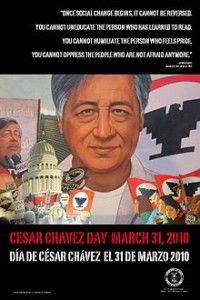Brown Upholds Farm Worker Secret Ballot
by CalWatchdog Staff | June 30, 2011 8:03 am
JUNE 30, 2011
By KATY GRIMES
After months of protests, lobbying and speeches, on March 31, César Chávez Day, the California Senate passed SB 104[1] to eliminate secret ballot elections for farm workers voting on unionization.
And Tuesday night, in a move that surprised many, Gov. Jerry Brown vetoed the bill authored by Senate President Pro Tem Darrell Steinberg, D-Sacramento. In his veto message, the governor wrote: “I am not yet convinced that the far reaching proposals of this bill — which alter in a significant way the guiding assumptions of the ALRA[2] [Agricultural Labor Relations Act] — are justified. Before reconstructing California’s carefully crafted agricultural labor law, it is only right that the Legislature consider legal provisions that more faithfully track its original framework.”
 [3]
[3]
Most interesting is how the bill has been presented by the media. “Gov. Jerry Brown vetoed legislation tonight that would have let farmworkers unionize more easily, despite intense pressure from fellow Democrats and labor allies who considered Brown their best chance in years to pass the bill,” one Sacramento Bee story reported[4].
But opponents of “card check” say it would take away numerous rights and protections currently afforded to workers at companies and businesses where unions are actively seeking to organize. And apparently Brown agreed.
This week, hundreds of farm workers and family members, including many children, shuttled to Sacramento in chartered buses. They protested at the Capitol, chanting, “¡Si, se puede!” And they held up signs demanding fair treatment.
The United Farm Workers[5] union even put on display a chair they claimed once belonged to Chavez[6].
César Chávez Opposed Card Check
But never in the protests or speeches did anyone acknowledge that Chávez opposed card check, and was a supporter of the secret ballot for the farm workers’ union.
“This bill would permit agricultural employees, as an alternative procedure, to select their labor representatives by submitting a petition to the board accompanied by representation cards signed by a majority of the bargaining unit,” reads the bill.
Ironically, on the same March day that the Assembly spent honoring Chavez with lengthy speeches, the assembly members also passed ACR 12, authored by Asemblyman Tony Mendoza. It “would recognize March 31, 2011, as the anniversary of the birth of César Chávez, and would call upon all Californians to participate in appropriate observances to remember César Chávez as a symbol of hope and justice to all persons.”
However, always left out of the speeches about imposing card check rules on farm workers is the history of Chávez supporting the secret ballot back in the 1970’s — as did Jerry Brown, who was governor at the time and had worked with Chávez to enact the Agricultural Labor Relations Act in 1975.[7]
Under card check, secret-ballot union elections would be replaced with the “card check” system, which would allow a union to organize if a majority of employees simply sign a card. The card is then made public to the employer, the union organizers and co-workers.
But also under a card-check system, workers face intimidation from the union, management or both, which the UFW is already employing to increase UFW membership.
It it is ironic that the union that César Chávez founded and through which he fought for secret union elections for farm workers is now using intimidation and coersion to take away secret-ballot elections.
But Steinberg has argued that it is employers who do the intimidating. He even included in the bill a $20,000 fine on employers who interfere with or violate the unionization process. But no such fine was included in the bill for union violations.
Union Decline
Outside of public-employee unions, private sector labor unions have been declining[8] in membership in California and in the rest of the country. Proponents of card check laws say that encouraging union activity and membership should occur because workers need the representation. But adulterating the election process is coming under a great deal of scrutiny; undermining the secret-ballot process sends the wrong message to new or growing businesses that could create jobs. And in California, jobs and employers are leaving the state in droves.
What was left out of most stories about the Steinberg bill was that the cards could be signed up to one year in advance and put on a shelf before ever being used. The bill’s language reads, “A representation card remains valid for 12 months after it is signed by an agricultural employee.”
And there would be no rigorous check on the employment of the card signer, leaving a potential hole in the authenticity of the election.
SB 104 was approved along party lines in both the Senate and the Assembly, as well as throughout the committee process. And while Brown’s veto surprised many, many others are not surprised and quietly say that this veto was just for show, and to plan on seeing him sign the next card check bill presented.
- SB 104: http://leginfo.ca.gov/pub/11-12/bill/sen/sb_0101-0150/sb_104_bill_20110112_introduced.pdf
- ALRA: http://en.wikipedia.org/wiki/California_Agricultural_Labor_Relations_Act
- [Image]: http://www.calwatchdog.com/wp-content/uploads/2011/05/Cesar_Chavez_Day.jpg
- Sacramento Bee story reported: http://familiesprotectingthevalley.com/topstory.php?ax=v&n=99&id=99&nid=2407
- United Farm Workers: http://en.wikipedia.org/wiki/César_Chávez
- Chavez: http://en.wikipedia.org/wiki/César_Chávez
- Agricultural Labor Relations Act in 1975.: http://en.wikipedia.org/wiki/California_Agricultural_Labor_Relations_Act
- declining: http://en.wikipedia.org/wiki/Labor_unions_in_the_United_States
Source URL: https://calwatchdog.com/2011/06/30/brown-vetoes-card-check-for-now/